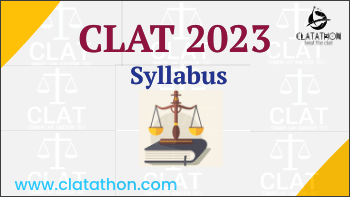As per the schedule, the CLAT 2023 will be conducted on 18 December 2022 across various exam centres in the country. Also, Common Law Admission Test for 2023 will be held for both undergraduate (UG) and postgraduate (PG) courses.
The Common Law Admission Test (CLAT) date for 2023 has been announced by the Consortium of National Law Universities. Those who are eligible and interested can register for the examination by visiting the official website - consortiumofnlus.ac.in.
The online registration process will begin soon, Aspirants are advised to keep following the official website of Consortium of NLUs to get more updates on the timetable and other details -consortiumofnlus.ac.in.
CLAT Eligibility Criteria 2023
CLAT 2023: Syllabus
Check the detailed CLAT Syllabus and all the sections to be covered for comprehensive preparation.
1. English Language
• In this section, passages of about 450 words will be given to test the comprehension skills of the applicant. The difficulty level of passage will pertain to the general understanding of a class 12th student. The passage can be derived from non-fiction and fiction. The average reading time for a passage pertains to 7-8 minutes.
The given passage will test the ability of the applicants regarding:
• Language skills Comprehension
• Drawing an inference from the given passage
• Identifying the core issues on which the passage is based.
2. Current Affairs/General Knowledge
• This section will also contain a passage of around 450 words.
• It will be containing information from news and non-fiction not particularly based on the legal domain as prior knowledge of the law is not tested in CLAT.
The question that will follow the passage will test the applicant on the knowledge of:
• Contemporary International Relations/Affairs
• Current Legal Affairs of national and international importance
3. Quantitative Techniques
• This section deals with analysing the basic arithmetic of the applicants by assigning 5-6 passages to interpret the data given thereto with a total of 15 - 17 questions.
• Graphical representation or passage follows a set of questions derived from that data to test the analytical ability of the applicant. Percentages, Ratios, Averages, Profit & Loss along with time & work determine the maximum chunk of questions in this section.
• The questions will be of elementary that is up to the level of 10th standard, there is no need to further dive into the secondary stage of mathematics that is there in the syllabus of class XI & XII.
4. Logical Reasoning
• This section deals with analysing the basics of critical aspects of the applicants by assigning 9-10 passages with a total of around 29-30 questions.
• This section requires lots of practice and applicants need to get themselves acquainted with the questions that are asked to solve them in less time.
Analytical Reasoning
• Puzzles, Circular Arrangements, Syllogism, and Inequality determine the maximum chunk of questions in this section.
• Only through guidance and practice, one can master the art of solving logical reasoning questions as it is set on a definite pattern.
5. Legal Reasoning
• It is the core of the question paper. One needs to excel in reading and comprehension to attempt the paper holistically.
• The knowledge regarding fundamental legal principles enshrined in the constitution can vastly enhance the chance of an applicant in securing good marks in the CLAT.
• Legal awareness of an applicant helps him/her in understanding the background of the questions as CLAT now focuses more on comprehension and drawing relevancy along with inferences from given passage/circumstance.
This section tests the legal awareness of applicants in the Legal Aptitude section which is divided into three parts namely Legal Facts, Legal G.K, and Legal Reasoning. Additionally, the whole section of the Legal Aptitude section acts as a tie-breaker in deciding the rank if the score of applicants matches. This section should be on priority for the applicants to secure a good institute.
|
English |
450 words each
|
Passages, Reading, Comprehension, Inference and Conclusion, Summary, Vocabulary etc. |
|
Current Affairs
|
450 words each
|
Contemporary Events of National and International Significance, Art and Culture, International Affairs, Historical Events of significance |
|
Legal Reasoning
|
450 words each
|
Rules and Passages of Law, Application of the rules and passages, etc. |
|
Logical Reasoning
|
300 words each
|
Argument – Premise and Conclusion, Inference, Relationships and Analogies, Contradictions and Equivalence, etc. |
|
Quantitative Techniques
|
- |
Basic Algebra, Mensuration, Statistical Estimation, Graphs, Numerical Information, Ratio and Proportion etc. |
Each section of the UG CLAT Paper will have you evaluating a passage of varying word counts and answering objective-type questions based on the passage.
Weightage of each subject
The UG-CLAT 2023 shall be a 2-hour test, with 150 multiple-choice questions carrying 1 mark each. There shall be a negative marking of 0.25 marks for every wrong answer. There must be conceptual clarity in the applicants regarding the questions asked in the paper and complete CLAT Exam Pattern.
|
Subjects |
No. of Questions |
|
English Language |
28-32 questions, |
|
Current Affairs, including General Knowledge |
35-39 questions |
|
Legal Reasoning |
35-39 questions |
|
Logical Reasoning |
28-32 questions |
|
Quantitative Techniques |
13-17 questions |
Remember, the key to success in any competitive exam lies in outperforming your peers. Since there is no way to determine how other students will fare, your best approach is to target the highest possible marks. Prepare in a manner that you can solve questions quickly and correctly and to achieve this, Online Mocks play a major role as they are timed tests with the exact pattern of the exam.
Also, check CLAT Books List
Revision is one of the most important aspects of any competitive exam preparation to retain the concepts that have been read by the applicant. Practice CLAT quiz to ensure a better understanding of all the sections.
Early identification of problematic areas with the help of mentors is required to divide the concentration and time as per the relatively weaker part of the applicant.
Regular practice of the CLAT Mock Test will ensure regular revision & practice.
A good pear group enhances both the competitive environment along with making it easy for the applicant to assess his/her performance. CLATATHON community comes very handily in this particular situation as it is the largest community-based e-learning platform in India.
Candidates preparing for CLAT 2023 can also seek guidance from CLAATHON experts via CLAT Online Classes.
The importance of asking questions must not be neglected and the effort an applicant puts in asking a relevant question derives good suggestions from his/her peers along with the mentors.
Still confused about how to prepare, enroll in "A Comprehensive Course for CLAT 2023". We have the perfect solution for you. Take a free trial of the course and experience the quality education that will be provided to you. So, students, with a proper approach and better guidance, Crack CLAT 2023 & Reach Your Dream NLU! So, why wait?
Download CLAT Question Papers for better clarity on the exam pattern and practice.
To get in touch, write to us at- ask@clatathon.com
Follw us 
![]()






